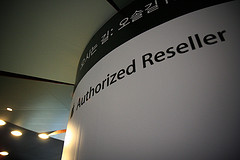 Source: Flickr Alfonso Pierantonio, Licensed under CC
Source: Flickr Alfonso Pierantonio, Licensed under CC
One of the most frequent preoccupations (and stresses) of SaaS leadership is how to expand reach and sell to more people...Distribution...Even in the best managed sales groups, there is a limit on the number of leads that you can reach. Often, software companies turn to strategic partners and resellers to gain broader market exposure. Resellers come in many varieties and can be great to work with if you find the right ones. But that’s the tricky part - finding the right reseller partners. Here’s four steps that have worked for us in finding the right reseller.
Find the Right Vertical
The first step is to figure out which vertical a great reseller plays in. For example, if you are a sales and marketing automation company, your customers are probably using some combination of Salesforce, Marketo, Pardot, NetSuite, or Hubspot. You need to find resellers that work with these types of companies. Too many times, startups will get excited about chasing big potential resellers, only to learn that most resellers aren’t a great fit for their product and customer base. Within the appropriate verticals there will be a handful of big resellers, with the majority being small and mid-sized shops.
Create Your Dream Team List
Once you figure out which verticals you want to engage in, its time to figure out who the top players are. This can be tricky. There isn’t a ton of information available on resellers, let alone a single source telling you who the top 10 resellers are. This is where you employ your Google-Fu and put in some focus time. Create your dream team list with the understanding that you’ll often have bigger revenue opportunities with small and mid-size resellers with an existing portfolio of clients.
Hit the Phones
Many large resellers will have a dedicated place where you can apply and have your product evaluated. However, securing resellers can take a lot of brute force - cold calling, Linkedin connection campaigns, and email blasts will be your best friends. In almost every case, we like to call the company and get the right person on the phone. As soon as you get to the right person, be clear about your purpose for calling, which is to inquire about partnering with the reseller to offer your product to their customers. Treat this call as you would any sales call and push for the next step being a product demo and discussion about potential fit within their portfolio.
Build Your Pitch
Every reseller has two primary needs you have to address. The first is the fit of your product into their existing portfolio of selling options. Resellers have (very carefully) curated lists of customers that trust them to bring the best solutions available for their specific needs. You should articulate how your product will not just fit in, but magnify the effectiveness of existing product offerings. The second requirement is a viable financial model. Depending on the reseller’s sales process and structure, they will be looking at current conversion rates, price points, commission structures, and sales forecasts. Before discussing a relationship with a reseller, be sure to gain a thorough understanding of their process and do some analysis. Build the case that this opportunity makes sense for the both of you. It has to be a win-win deal.
Finding resellers, while an exciting opportunity for your company, is much like your core sales processes. It will take time. At times it can be long, tedious, and frustrating. But when you find the right partners, it can add rocket fuel to your business.
For more great content try:
4 ways to sell your product like you're pitching to a vc





